Corona Virus: Facts worth knowing about the effects on the body
The number of infections due to the new corona virus COVID-19 is increasing worldwide. Governments are taking exceptional measures to limit the spread. However, there is still a lot of confusion about what exactly the virus does to people's bodies. The symptoms are mostly fever, cough and shortness of breath. However, these can indicate any number of diseases – from flu to the common cold. In this post, we have therefore summarized the most important medical information about the progression of the infection caused by the new corona virus.
What causes the corona virus?

Most health officials believe that the body's response to the disease occurs in three stages. This type of SARS spreads mainly through droplets that get into the air through coughing or sneezing. This allows people nearby to pick them up through their nose, mouth or eyes. The virus particles in these droplets then quickly migrate to the back of your nasal passages and to the mucous membranes in the back of your throat. There they bind to a specific receptor in cells. Coronavirus particles have spiked proteins that protrude from their surfaces. These hook into cell membranes so that the genetic material of the corona virus can get into the human cell. The disease is mild for most people, but some patients die from it.
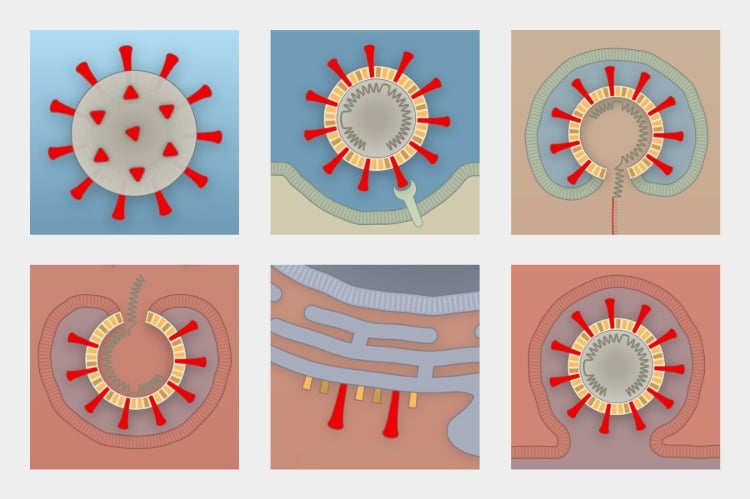
So the corona virus, officially called Sars-CoV-2, can enter your body if you breathe it in after someone coughs nearby, or if you touch a contaminated surface and then your face. At this early stage, you won't be sick and some people may never develop symptoms. The incubation period, the time between infection and the appearance of the first symptoms, varies widely, but is an average of five days. In addition, COVID-19 is a mild infection for eight out of ten people who get it, and the core symptoms are fever and cough. Body pain, sore throat and headache are all possible, but not guaranteed.
Slight symptoms

The fever and general feeling of restlessness are due to your immune system responding to the infection. It has identified the virus as an enemy intruder and signals the rest of the body that something is wrong by releasing chemicals called cytokines. These strengthen the immune system, but also cause body aches, pains and fever.
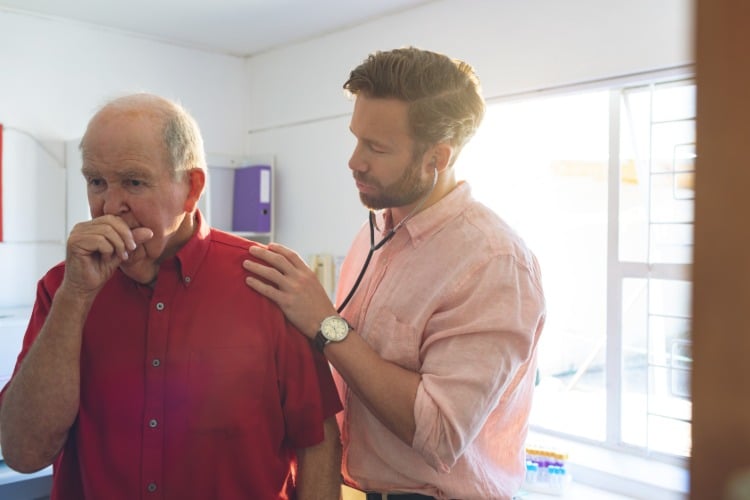
The cough is initially dry, which is likely due to the irritation of the cells when they become infected with the virus. Some people will start coughing sputum at some point. This is a thick mucus that contains dead lung cells that are killed by the virus. These symptoms are treated with bed rest, plenty of fluids, and possibly with acetaminophen. You do not need special hospital care. This stage lasts for about a week – at this point, most are recovering because their immune system has warded off the virus. However, some will develop a more serious form of the condition.

When copies of the virus multiply, they burst out and infect neighboring cells. Symptoms often begin in the throat with a sore throat and dry cough. The virus then gradually creeps through the bronchi. When it reaches the lungs, their mucous membranes become inflamed. This can damage the alveoli or lung bags and they have to work harder to perform their function. They oxygenate the blood circulating in the body and remove carbon dioxide from the blood so that you can exhale it. So this is the most current information that medical professionals currently know about this stage. However, there are studies that indicate that the condition can also cause symptoms such as a cold with a runny nose.
Possible complications with Corona Virus
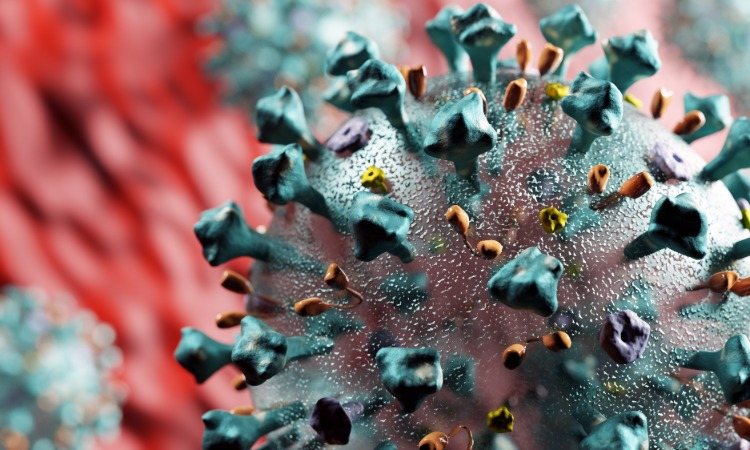
As the disease progresses, it is because the immune system overreacts to the corona virus. These chemical signals to the rest of the body cause inflammation, which however must be carefully balanced. Too much inflammation can cause side effects throughout the body. “The virus triggers an imbalance in the immune response, there are too many inflammations. We don't know how to do that, ”said Nathalie MacDermott of King’s College London. The swelling and disturbed oxygen flow can cause these areas in the lungs to fill with fluid, pus, and dead cells. Pneumonia, an infection in the lungs, can occur. Some people have difficulty breathing that they have to be connected to a ventilator. In the worst case, known as severe acute respiratory syndrome, the lungs fill with so much fluid that breathing support cannot help and the patient dies.

It is believed that around 14% of people are affected by this phase, based on data from China. It is estimated that around 6% of cases become seriously ill. At this point the body begins to fail and there is a real chance of death. The problem is that the immune system gets out of control and causes damage all over the body. It can lead to septic shock if blood pressure drops to dangerously low levels and the organs stop working properly or fail completely. For example, this can prevent the kidneys from cleaning the blood, thereby damaging the intestinal mucosa. If the immune system cannot penetrate the virus, it eventually spreads to every corner of the body, where it can do even more damage.
Treatment of serious cases
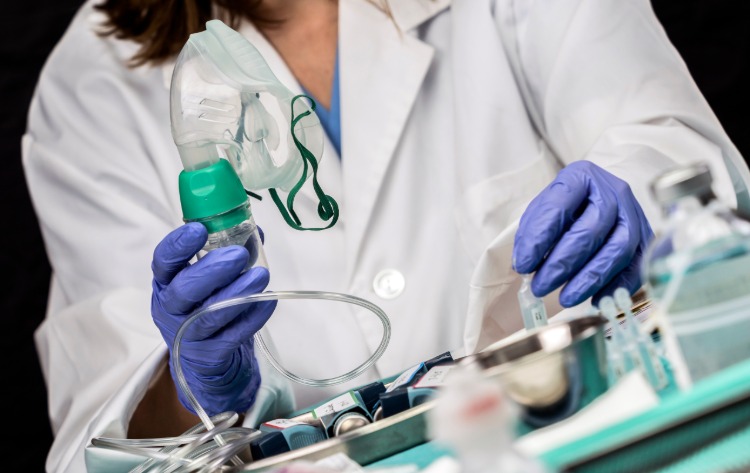
Treatment at this stage is very invasive and can include ECMO or extracorporeal membrane oxygenation. This is essentially an artificial lung that draws blood from the body through thick tubes, supplies it with oxygen and pumps it back in. At some point, however, the damage can reach deadly levels at which organs can no longer keep the body alive. While the corona virus appears to be zero in the lungs, experts may also be able to infect cells in the gastrointestinal system. This may be the reason why some patients experience symptoms such as diarrhea or indigestion. The virus can also get into the bloodstream.
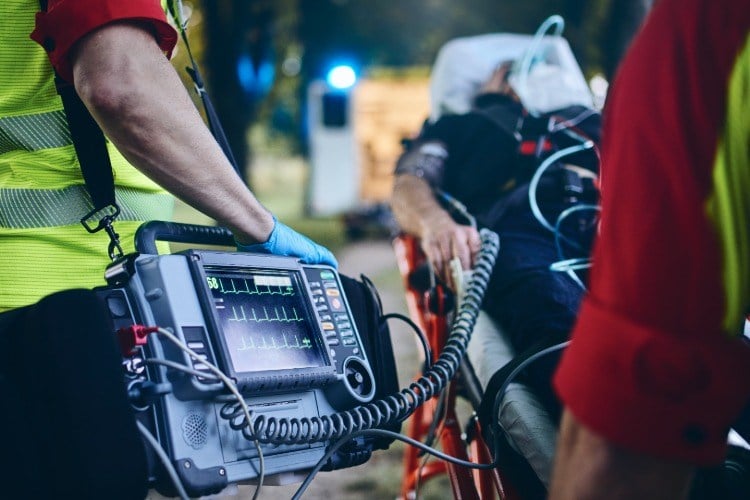
The bone marrow and organs such as the liver can also become inflamed, according to the scientists. Inflammation in small blood vessels can even occur, as was the case with SARS, the virus outbreak in 2002 and 2003. While the body's immune system goes into high gear to fight the infection, the resulting inflammation can cause these organs to malfunction. As a result, some patients may experience harm caused not only by the virus, but also by their own immune systems when fighting the infection. Experts have not yet documented whether the virus can affect the brain. However, scientists who study SARS have suggested that SARS virus could infiltrate the brain in some patients. Given the similarity between SARS and COVID-19, it has been argued that the possibility that the new coronavirus might infect some nerve cells should not be excluded.
Severity of those affected
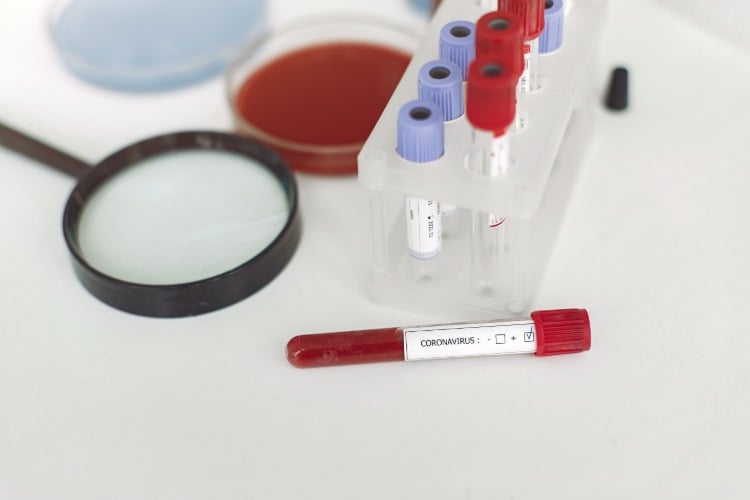
Approximately 80 percent of people infected with the new corona virus have relatively mild symptoms. However, the remaining 20 percent become more seriously ill. The disease was fatal to approximately 2 percent of patients in China, where most cases have occurred. Experts say the effects depend on how robust or weakened a person's immune system is. Older people or those with underlying health problems such as diabetes or another chronic illness are more likely to develop severe symptoms. Although the disease is similar in many ways to SARS and has similarities to influenza and pneumonia, the course of a patient's coronavirus has not yet been fully elucidated.

So in older adults there is the greatest risk of being severely affected by the Corona Virus. The data also confirm this fact. A breakdown of all known cases and deaths by the Chinese Center for Disease Control and Prevention shows that 14.8% of infected patients aged 80 and over died of the effects. The mortality rate for younger patients in China was much lower. Research shows that those with underlying health are at higher risk of contracting the virus. This includes cardiovascular diseases, diabetes, chronic respiratory diseases, high blood pressure and cancer.
The post Corona Virus: Facts worth knowing about the effects on the body appeared first on Deavita.com | Living ideas, design, hairstyles, make-up, lifestyle, health and beauty tips.





















